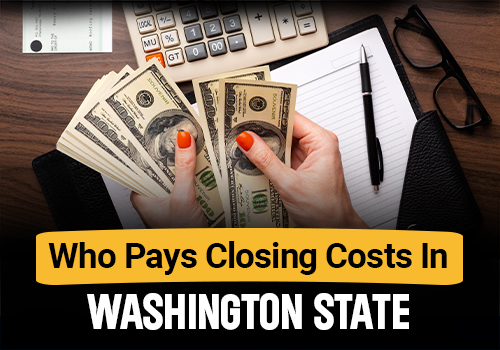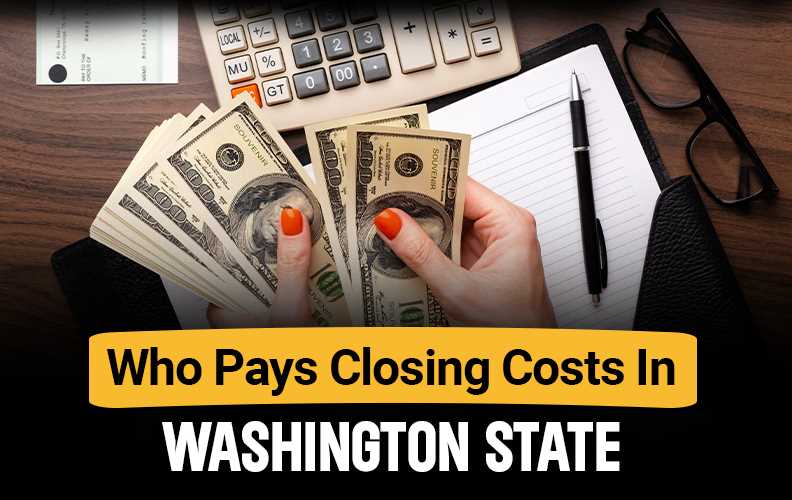Who pays closing costs in Washington State
Monday, August 12, 2024


When buying or selling a home, understanding the intricacies of closing costs is crucial. In Washington State, as in other states, these costs can be a significant part of the transaction. Knowing who pays closing costs in Washington, the types of costs involved, and how they are typically split can help buyers and sellers navigate the process more effectively. This comprehensive guide will explore these topics in detail.
What Are Closing Costs?
Closing costs refer to the charges incurred during the buying or selling of a property. They are incurred by both buyers and sellers and cover various services required to finalize the real estate transaction. These costs can include loan origination fees, appraisal fees, title insurance, escrow fees, and more.Who Pays Closing Costs in Washington?
Closing costs in Washington can vary depending on the agreement between the buyer and the seller. Typically, both parties share these costs, but the distribution can differ based on negotiations, market conditions, and local customs. Here is a breakdown of who typically pays what in Washington:Buyers' Closing Costs
- Loan Origination Fees: These are fees charged by the lender for processing the loan application. They usually range from 0.5% to 1% of the loan amount.
- Appraisal Fees: The buyer usually pays for the appraisal, which is required by the lender to determine the property's market value. This can cost between $300 and $500.
- Home Inspection Fees: Although not always mandatory, home inspections are highly recommended to uncover any potential issues with the property. This typically costs between $300 and $500.
- Credit Report Fees: Lenders require a credit report to assess the buyer's creditworthiness. This fee can range from $25 to $50.
- Title Insurance: The buyer typically pays for the lender's title insurance, which protects the lender in case of any title disputes. This cost varies but can be around $1,000.
- Escrow Fees: Both parties often share these fees, but the buyer's portion can range from $500 to $2,000 depending on the property's price.
- Prepaid Interest: Buyers pay interest on the mortgage from the date of closing until the end of the month. This amount varies based on the loan amount and interest rate.
- Property Taxes and Homeowners Insurance: Buyers need to prepay a portion of property taxes and homeowners insurance, which are held in an escrow account.
Sellers' Closing Costs
- Real Estate Commissions: This is often the largest cost for sellers, typically around 5% to 6% of the home's sale price, split between the buyer's and seller's agents.
- Title Insurance: Sellers usually pay for the owner's title insurance policy, protecting the buyer against title issues. This cost can be around $1,000 to $2,000.
- Escrow Fees: As mentioned, these fees are often shared, with the seller's portion ranging from $500 to $2,000.
- Transfer Taxes and Recording Fees: Sellers pay the transfer taxes and fees for recording the deed with the county. These costs can vary but are generally a few hundred dollars.
- Prorated Property Taxes and HOA Fees: Up until the date of closing, sellers are responsible for their portion of the property taxes and homeowners association (HOA) dues.
Average Closing Costs in Washington State
The average closing costs in Washington State can vary widely depending on the location, price of the home, and the specific terms of the transaction. However, on average, buyers can expect to pay between 2% and 5% of the purchase price in closing costs, while sellers can expect to pay between 6% and 10% due to the real estate commissions.For example, on a $400,000 home, buyers might pay between $8,000 and $20,000 in closing costs, while sellers could pay between $24,000 and $40,000.
Negotiating Closing Costs
In Washington, it is common for buyers and sellers to negotiate who pays for certain closing costs. For instance, a buyer might request the seller to cover some or all of the closing costs as part of the offer. This is often referred to as a "seller concession." In a buyer's market, sellers might be more willing to agree to such concessions to close the deal.For example Bellevue, WA, Homes for Sale Conversely, in a seller's market, buyers might need to be prepared to cover more of the closing costs themselves to make their offer more competitive.
How to Reduce Closing Costs
Both buyers and sellers can take steps to reduce their closing costs. Here are some strategies:For Buyers
- Explore various lending options: Each lender may charge distinct fees. Comparing loan estimates from multiple lenders can help you find the best deal.
- Negotiate Fees: Some closing costs, such as application fees or processing fees, might be negotiable. Don’t hesitate to ask your lender if any fees can be reduced or waived.
- Request Seller Concessions: As mentioned, buyers can negotiate for the seller to cover some closing costs.
- Choose a No-Closing-Cost Mortgage: Some lenders offer loans with no closing costs in exchange for a higher interest rate. This can be beneficial if you plan to refinance or sell the home in a few years.
For Sellers
- Negotiate Commission Rates: Real estate commission rates are not set in stone. You have the option to discuss a reduced rate with your agent.
- Shop for Title and Escrow Services: Just like with lenders, the costs for title and escrow services can vary. Shopping around can save you money.
- Consider a FSBO (For Sale By Owner): Selling your home without an agent can save on commission costs, though it requires more effort and expertise on your part.
Understanding the Good Faith Estimate (GFE) and Closing Disclosure
For buyers, understanding the Good Faith Estimate (GFE) and the Closing Disclosure is essential. The GFE, provided by the lender within three days of applying for a loan, outlines the estimated closing costs. It includes information on the loan terms, interest rates, and fees.The Closing Disclosure, provided at least three days before closing, gives the final details about the loan and closing costs. It is important to review this document carefully to ensure there are no unexpected charges or discrepancies compared to the GFE.
Common Closing Cost Fees
Here are some common fees that buyers and sellers might encounter during a transaction in Washington State:- Loan Origination Fee: Fee charged by the lender for processing the loan application.
- Underwriting Fee: Fee for the lender's underwriting process.
- Appraisal Fee: Cost of hiring a professional appraiser to assess the property's value.
- Title Search Fee: Fee for the title company to search public records and ensure the title is clear.
- Title Insurance: Insurance policy protecting against title disputes.
- Escrow Fee: Fee for the escrow service managing the closing process.
- Recording Fee: Fee for recording the deed with the county.
- Transfer Tax: Tax paid to transfer the property title from seller to buyer.
- Homeowners Insurance: Insurance policy protecting the home and its contents.
- Prepaid Interest: Interest paid from the closing date to the end of the month.
Categories:
Market Update
We would like to hear from you! If you have any questions, please do not hesitate to contact us. We are always looking forward to hearing from you! We will do our best to reply to you within 24 hours !




